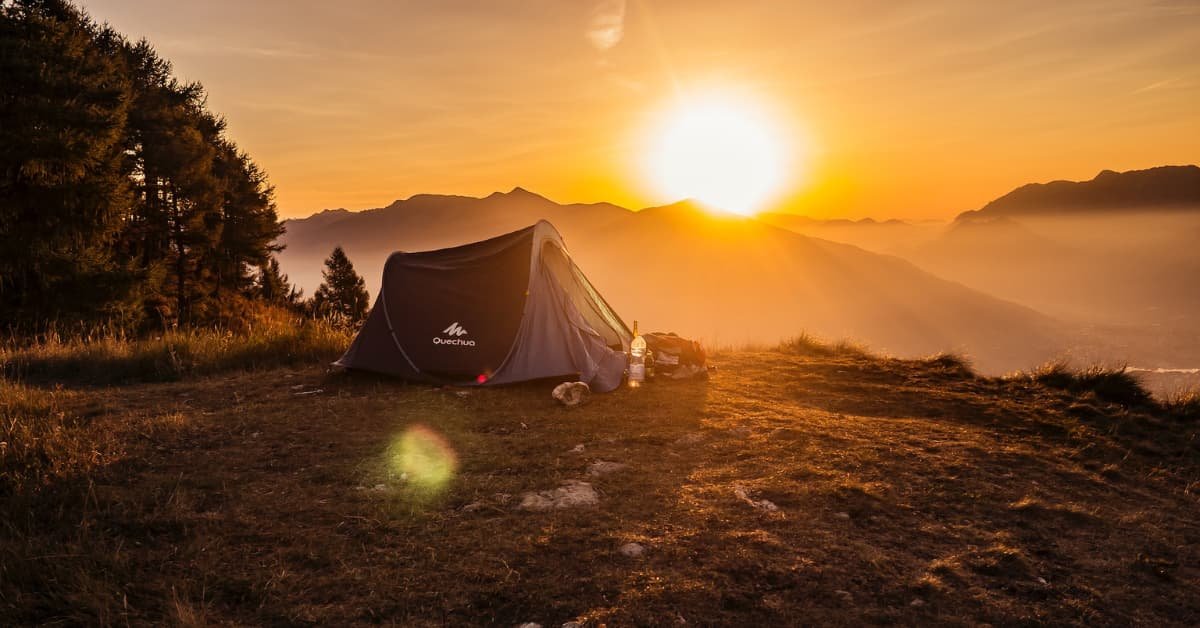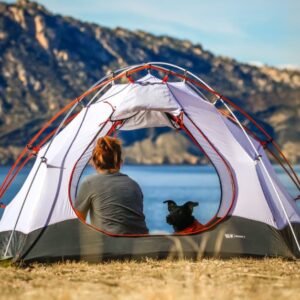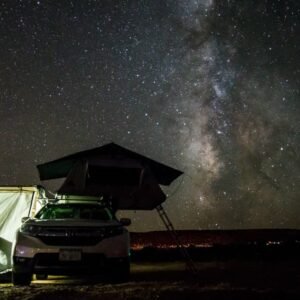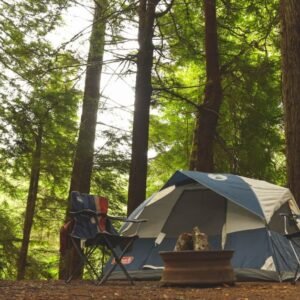
Camping is a popular outdoor activity that offers a chance to escape the hustle and bustle of daily life and immerse oneself in nature.
This article provides 10 essential tips for staying safe while camping, covering a range of safety considerations including personal safety, campsite safety, and tips for different weather conditions.
Overall, these tips are designed to help campers stay safe and enjoy their camping experience to the fullest.
Short Summary
- Camping safety considerations include personal safety, campsite safety, and never being truly alone.
- Proper preparation, including knowing the wildlife and ecosystem of the park, is key to staying safe while camping.
- Specific safety tips include being aware of fire bans, the risk of floods, falling trees, and lightning storms.
- General camping safety tips include checking weather conditions, properly setting up and securing the tent, storing food properly, respecting wildlife and other campers, and having a plan in place for emergencies.
Types of Safety Considerations
The pre-existing knowledge suggests that when camping, it is important to consider three main types of safety: personal safety, campsite safety, and the avoidance of being truly alone.
Personal safety tips include staying hydrated, using sunscreen, and having a first aid kit.
However, it is also crucial to be aware of the wildlife and ecosystem of the park, as this knowledge can help prevent injuries or dangerous encounters.
For example, understanding how to avoid attracting wildlife or knowing when certain animals are most active can be invaluable information for staying safe.
Seasonal safety precautions are also necessary for camping. In hot conditions, campers need to be mindful of heat exhaustion and ensure they stay hydrated.
In cold and in-between weather, campers need to be prepared for the elements with appropriate gear and clothing and know how to properly set up a tent to stay warm and dry.
Furthermore, campers should always be aware of their surroundings and potential hazards, such as fallen trees or flash floods, and take necessary precautions to avoid danger.
Personal Safety Tips
Hydration, sun protection, and first aid are important considerations to keep in mind when ensuring personal safety while camping.
It is essential to bring enough water for the duration of the trip and to drink regularly, especially in hot weather conditions.
Sunscreen should also be applied regularly to protect against harmful UV rays. In addition to these measures, having a well-stocked first aid kit is crucial in case of emergencies.
The kit should include essential items such as bandages, antiseptic wipes, pain relievers, and insect repellent.
To emphasize the importance of hydration and sunscreen, the following table can be used:
| Hydration Tips | Sunscreen Tips |
|---|---|
| Drink plenty of water and electrolyte-rich fluids | Use a sunscreen with at least SPF 30 |
| Avoid alcohol and caffeine, which can dehydrate the body | Apply sunscreen at least 15 minutes before sun exposure |
| Monitor urine color to ensure adequate hydration | Reapply sunscreen every two hours or after swimming/sweating |
By following these tips, campers can ensure that they stay safe and healthy while enjoying the great outdoors.
It is also important to regularly review and replenish the first aid kit, as well as to have knowledge of basic first aid techniques.
In the event of an emergency, quick and effective action can make all the difference.
Campsite Safety Tips
Proper scanning for potential hazards and appropriate waste disposal are crucial considerations for ensuring safety at the campsite.
Before setting up camp, it is important to scan the area for potential dangers such as unstable trees, sharp rocks, and steep drop-offs.
Once the campsite is deemed safe, it is important to choose a location for waste disposal that is away from the campsite and any water sources.
All waste should be properly disposed of in a designated garbage can or buried at least six inches deep.
This not only helps keep the campsite clean but also prevents attracting wildlife to the area.
Proper food storage is also essential for campsite safety. All food should be stored in airtight containers and kept away from the tent to avoid attracting bears and other wildlife.
A bear can smell food from up to three miles away, so it is important to take extra precautions when camping in areas with a high bear population.
Additionally, it is important to clean all cooking utensils and dishes thoroughly to prevent food contamination.
By following these simple guidelines, campers can ensure a safe and enjoyable camping experience.
Never Being Truly Alone
Having a buddy system in place and letting someone know your itinerary are important safety measures to take when camping to ensure that you are never truly alone.
The buddy system is a simple yet effective way to ensure that someone is always aware of your whereabouts and can provide assistance in case of an emergency.
It is important to choose a trustworthy and responsible camping partner who is willing to stick to the buddy system plan.
Sharing your camping itinerary with someone is also crucial for your safety.
This information allows others to know where you are and when to expect you back, which is especially important in case of unexpected circumstances.
Your itinerary should include details such as your camping location, route, and expected return date.
It is also important to make sure that the person you share your itinerary with knows how to contact you and what to do in case they cannot reach you.
Taking these simple steps can help ensure your safety and provide peace of mind for both you and your loved ones.
Specific Safety Tips
One important aspect of camping safety is to be aware of potential hazards and weather conditions that may pose a risk to campers.
This includes staying vigilant about fire bans, floods, falling trees, and lightning storms.
By taking precautions and being prepared, campers can reduce the risk of injury or harm to themselves and others.
Here are some specific safety tips that campers can follow to stay safe while camping:
- Wildlife awareness: It is important for campers to understand the ecosystem and wildlife of the park they are camping in. This includes knowing what types of animals may be present, how to safely store food to avoid attracting wildlife, and how to react if encountering a wild animal.
- Extreme weather preparation: Campers should always be prepared for extreme weather conditions, whether it be hot, cold, or in-between weather. This includes bringing appropriate gear and clothing, checking weather conditions before heading out, and having a plan in place for emergencies.
- Proper tent set-up: It is crucial to properly set up and secure the tent to avoid injuries or damage caused by falling objects or inclement weather.
- First aid kit: Campers should have a well-stocked first aid kit and know how to use it in case of an emergency or injury. This includes knowing how to treat common camping injuries, such as cuts, burns, and insect bites.
FAQs:
What are some common medical emergencies that can occur while camping and how should they be handled?
Medical emergencies that can occur while camping includes snakebites and heat stroke. In the case of snakebites, keep the affected area immobilized and seek medical attention immediately. For heat stroke, move to a cooler area, hydrate, and seek medical attention if symptoms persist.
Are there any specific types of wildlife that campers should be particularly cautious of and how can they protect themselves?
Campers should be cautious of wildlife such as bears, snakes, and cougars. Protection tips include storing food properly, making noise while hiking, carrying bear spray, and avoiding direct eye contact with animals.
What are some common mistakes that inexperienced campers make that could put them at risk?
Inexperienced campers often make mistakes that put them at risk, such as insufficient preparation, lack of knowledge about wildlife, and poor campsite selection. Prevention tips include using essential camping safety gear, packing necessary items, and researching the area beforehand.
How can campers ensure that they are properly prepared for extreme weather conditions, such as hurricanes or blizzards?
To prepare for extreme weather conditions while camping, it is important to have emergency supplies such as first aid kits, weather radios, and extra food and water. Evacuation planning should also be considered in case of severe weather.
Are there any safety concerns that are unique to camping in certain geographic regions, such as deserts or mountains?
Camping safety in coastal areas may include avoiding high tide lines and being aware of rip currents. Forested regions require precautions for wildfires and bear encounters. Researching specific geographic regions for unique safety concerns is recommended.



